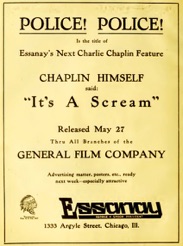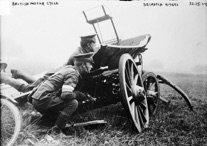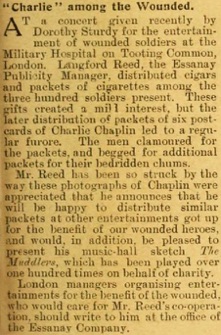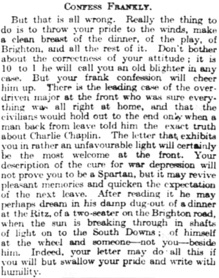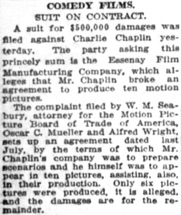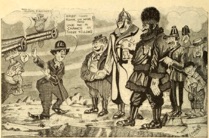Police Clippings 1/38
Moving Picture World, New York, May 13, 1916.
Uncut Charlie Chaplin Paper Doll, Valley Laundry, Stockton,
California, 1916, ebay
& „Stop that roar of war! And give me a chance at these fellows“
THE ONLY FEASIBLE PEACE PROPOSITION
THAT HAS YET BEEN SUBMITTED
(...) Cartoon, Motion Picture, Jan. 1916
& World War One. British motorcycle, despatch riders, 1910s.
Bain Collection, Library of Congress
& CONFESS FRANKLY.
But that is all wrong. Really the thing to do is to throw
your pride to the winds, make a clean breast of the
dinner, of the play, of Brighton, and al the rest of it. Don‘t
bother about the correctness of your attitude; it is
10 to 1 he will call you an old blighter in any case. But your
frank confession will cheer him up. The is the leading
case of the over-driven major at the front who was sure everything
was all right at home, and that the civilians would
hold out to the end only when a man back from leave told
him the exact truth about Charlie Chaplin.
(...) LETTERS TO THE FRONT.
The Need For Humility. (From a correspondent),
Times, London, March 11, 1916
& „Charlie“ among the Wounded
AT a concert given recently by Dorothy Sturdy for the
entertainment of wounded soldiers at the Military
Hospital on Tooting Common, London, Langford Reed,
the Essanay Publicity manager, distributed cigars
and packets of cigarettes among the three hundred soldiers
present. These gifts created a mild interest, but
the later distribution of packets of six postcards of Charlie
Chaplin led to a regular furore.
(...) Pictures and The Picturegoer, London, Nov. 13, 1915
& COMEDY FILMS.
SUIT ON CONTRACT.
A suit for $500,000 damages was filed against Charlie
Chaplin yesterday. The party asking this princely
sum is the Essanay Film Manufacturing Company, which
alleges that Mr. Chaplln broke an agreement
to produce ten motion pictures.
The complaint filed by W. M. Seabury, attorney for
for the Motion Picture Board of Trade of America,
Oscar C. Mueller and Alfred Wright, sets up an agreement
dated last July, by the terms of which Mr. Chaplin‘s
company was to prepare scenarios and he himself was
to appear in ten pictures, assisting, also, in their
production. Only six pictures were produced, it is alleged,
and the damages are for the remainder.
(...) Los Angeles Times, May 18, 1916
& Spoor Replies to Chaplin
George K. Spoor, president of Essanay, has issued
a statement in reply to the threat of Charles
Chaplin that he would enjoin the showing of the „Burlesque
on Carmen“ in four reels. This is one of the last
two photoplays produced by Chaplin for Essanay, the other
„Police,“ not yet having been released.
(...) Motography, Chicago, April 22, 1916
„Chaplin himself“
Advertisement. „Police! Police!
Is the title of
Essanay´s Next Charlie Chaplin Feature
Chaplin himself
said:
,It‘s A Scream.‘
Released May 27
Thru All Branches of the
General Film Company
Advertising matter, posters, etc., ready next week –
specially attractive
Essanay“ (...)
Police is released by Essanay May 27, 1916.
Anzeige
Alan Nevins & Henry Steele Commager, The Pocket History
of the United States, New York 1942: „In the presidential elections
of 1916 Wilson was successful, largely because he had ,kept
us out of war.‘“
He Kept Us out of War. That‘s his campaign slogan.
The fighting in Europe dominates the campaign. Woodrow Wilson campaigns for re-election on a pledge of continued neutrality
in the World War One
Election night is on November 7, 1916. The electoral vote
is one of the closest in American history – with 266 votes needed
to win, Wilson takes 30 states for 277 electoral votes, while
Hughes wins 18 states and 254 electoral votes.
After the sinking of seven U.S. merchant ships by submarines
and the publication of the Zimmerman telegram, Wilson
calls for war on Germany, which the U.S. Congress declares
on April 6, 1917.
Am 28. Juli 1914 hat der Erste Weltkrieg begonnen –
„the european war“ wird er oft in amerikanischen Zeitungen
vorerst noch genannt. Am 7. November 1916 gewinnt
US-Präsident Wilson die Wiederwahl. Sein Slogan –
He kept us out of war – ist erfolgreich. Am 6. April 1917 ruft
Wilson aber zum Krieg gegen Deutschland auf.

